About 20 opponents of a law that bans sidewalk lounging near businesses turned their backs on Chico City Council Tuesday night as it voted 4-3 to reinstate the so-called Sit and Lie Ordinance.
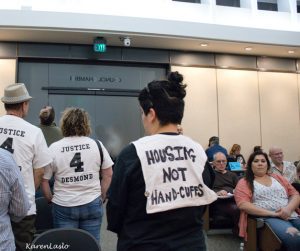
Audience members turn their backs on the Council in protest.
The protest was quiet and emphatic and different in character from the orchestrated disruptions at the Sept. 4 City Council meeting when Mayor Sean Morgan ordered the chamber cleared and the panel proceeded to advance the ordinance in an almost empty auditorium. (ChicoSol journalists were barred from that meeting.)
But in what he calls an act of “civil disobedience 101,” activist and ordinance opponent Patrick Newman was led from the chamber in handcuffs Tuesday after he refused to stop reading from a recent court ruling that struck down a disorderly conduct ordinance in Boise, Idaho, targetting people who were sleeping outside and on private property.
The case of Martin versus Boise was viewed quite differently by the two sides on the Sit and Lie issue in Chico.
Newman said the Sit and Lie Ordinance is a clear violation of the spirit of the ruling by the Ninth Circuit Court of Appeals. According to Newman, the ruling said that “it’s cruel and unusual punishment to ticket and jail people who are using the public space to survive” when no shelter beds are available.
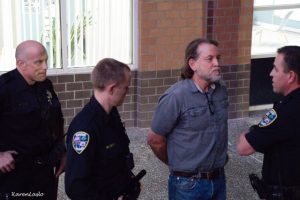
Patrick Newman was detained at the meeting.
City attorney Vince Ewing told the Council that Boise’s ordinance was far more sweeping than Chico’s Sit and Lie Ordinance, which will ban sitting or lying on a blanket, stool or other object on the sidewalk adjacent to a business between 7 a.m. and 11 p.m.
“Until a city can show that there are sufficient {shelter] beds, you can’t have a complete ban, city-wide, all hours,” Ewing said. But an ordinance can be passed that has time and place restrictions, he added.
“The Martin decision is clear that it doesn’t prohibit more limited ordinances,” Ewing said.
Councilman Andrew Coolidge, who came up with the idea of reinstating Chico’s expired Sit and Lie Ordinance in May and is running for re-election, moved to approve the ordinance after about 24 citizens had spoken, the majority opposed to its passage. The motion passed with additional support from Mayor Sean Morgan, Vice Mayor Reanette Fillmer and Councilman Mark Sorensen.
David Halimi, president of the Downtown Chico Business Association, spoke in favor of the ordinance.
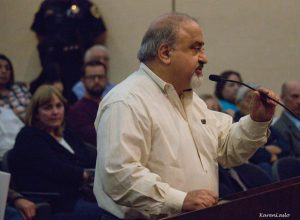
DCBA President David Halimi
“For businesses to expect to have their doorways unobstructed between the hours of 7 a.m. and 11 p.m. is a mere re-affirmation of the right to do business,” Halimi told the Council.
Fillmer said that despite what happens at public hearings on the ordinance, she believes, based on her contact with constituents, that more of Chico’s citizens are in favor of the ordinance than against.
“We’re merely asking people not to sleep on a sidewalk; they can sleep on the grass,” Fillmer said, adding that the city is working on providing day shelters and expanding services. “People are tired of what’s happening in the City of Chico,” the vice mayor said, blaming in part Gov. Jerry Brown and his enthusiasm for a bullet train. “The State of California has put us in this situation, Governor Brown has put us in this situation.”
Many of those who opposed the ordinance spoke with a note of resignation, certain that the ordinance would pass despite their arguments.
Angela McLaughlin, who recently became president of the board of directors of Safe Space, an organization that helps house the homeless during winter months, was one of those who were critical of the city attorney’s interpretation of the appeals court ruling.
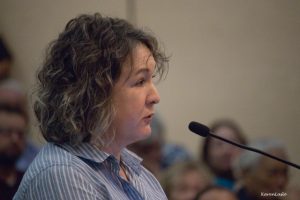
Angela McLaughlin, Safe Space
Like Boise, McLaughlin said Chico often runs out of shelter bedding.
Newman, the activist, was led out of the chamber by four officers after being intentionally detained. He was told he might hear from the Butte County District Attorney’s Office and then released.
“After five years of advocacy, you need to make a different kind of statement,” Newman said about his willingness to undergo arrest to make his point. Homeless people use the public space because they have no other choice, Newman said. “This is what we’ve allowed to happen during 40 years of Reaganomics.”
Opposing the ordinance on the Council were Ann Schwab, Karl Ory and Randall Stone.
“Yes, I realize that there is a problem with people sitting and lying on the sidewalks,” Schwab said. “The objection to this is that we do not have adequate housing or locations for people who do not have homes to be. And until we get to that place we should not be outlawing an activity.”
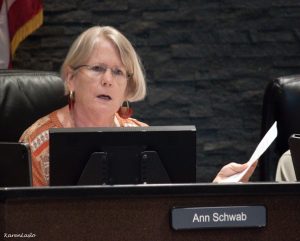
Councilwoman Ann Schwab
Schwab pointed out that the new ordinance will apply to all the city’s neighborhoods zoned for commercial use, not just downtown, and worried that it will push people into other areas. “I feel that this ordinance is a bandage that is not solving the problem and is going to make the problem worse,” she said.
Ewing told the Council that an infraction of the ordinance will generally cost $100, although Police Chief Michael O’Brien said most people comply when officers ask them to move, and those people are never cited.
Someone who is cited and doesn’t pay the fine or show up in court would likely become the object of a failure-to-appear warrant. Councilman Karl Ory asked if the infraction could become a “criminal event” and was told that it could.
A second hearing will be held on the ordinance next month when it could win final approval.
Leslie Layton is editor of ChicoSol.
